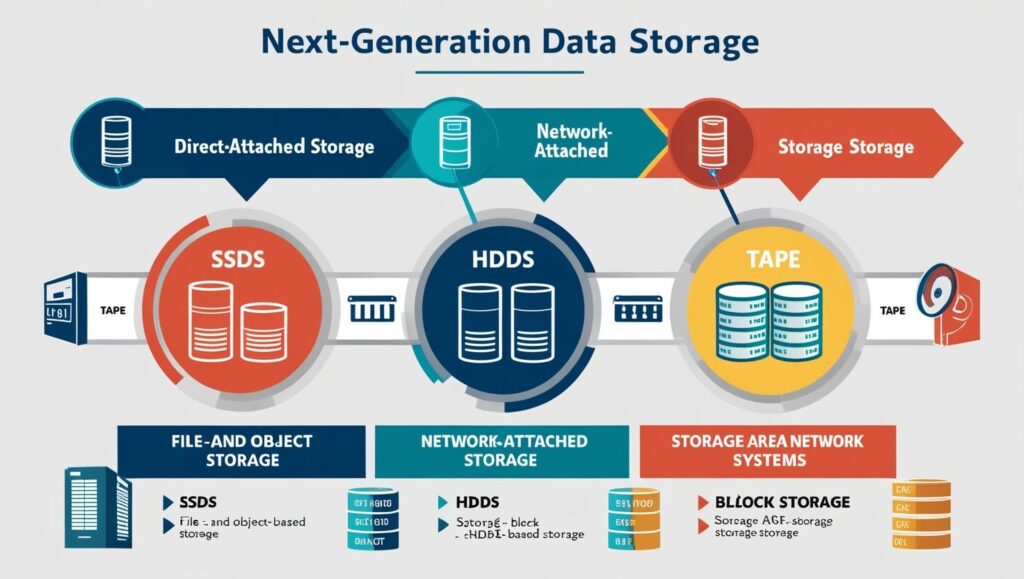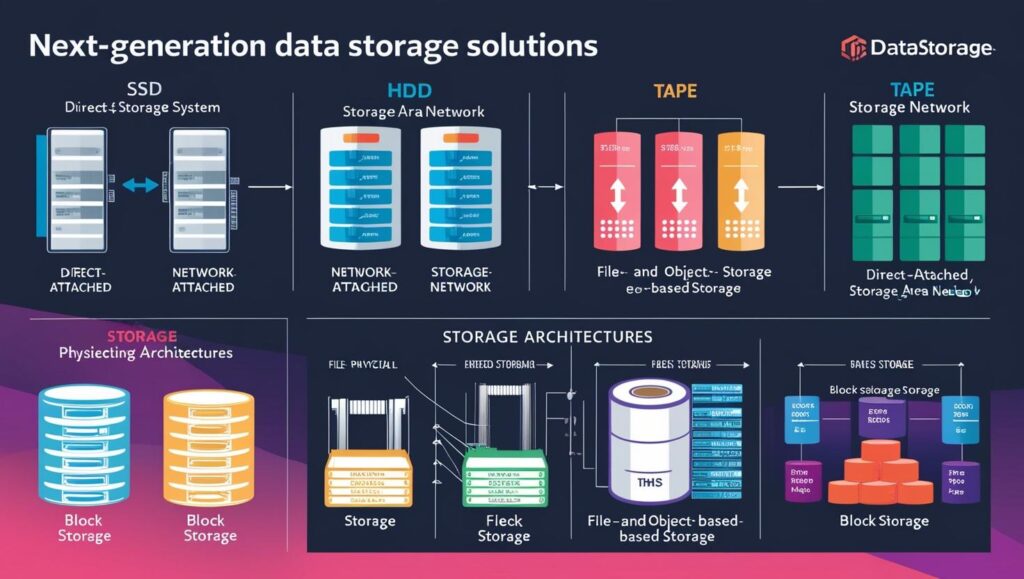The exponential growth of data is transforming industries, with more data being generated every day than ever before. As a result, traditional data storage solutions are reaching their limits in terms of efficiency, scalability, and security. To meet these evolving demands, next-generation data storage technologies are emerging, promising to unlock new capabilities that enable businesses and organizations to keep pace with this data deluge. These technologies are critical in sectors like cloud computing, artificial intelligence (AI), big data analytics, and IoT (Internet of Things), all of which rely on fast, secure, and efficient storage solutions.

This in-depth analysis explores the key components, advancements, and trends driving the development of next-generation data storage technologies, with a focus on their potential to improve efficiency, scalability, and security.
The next-generation data storage industry is projected to grow from USD 65.1 billion in 2024 and is estimated to reach USD 90.0 billion by 2029; it is expected to grow at a Compound Annual Growth Rate (CAGR) of 6.7% from 2024 to 2029.
1. The Need for Next-Generation Data Storage Technologies
The explosive growth of data across industries has led to the need for more efficient, scalable, and secure storage solutions. Several factors are driving this demand:
Data Explosion: The increasing use of IoT devices, AI-powered applications, cloud computing, and big data analytics has led to a significant increase in the volume of data generated daily. Gartner estimates that the total amount of data created worldwide will exceed 180 zettabytes by 2025, up from just 33 zettabytes in 2018. Storing and processing this vast amount of data requires advanced storage technologies.
Speed and Latency: Traditional storage solutions often struggle to provide the speed and low latency required by modern applications. For instance, real-time data processing in AI and big data applications requires storage that can quickly respond to input and output demands.
Security and Compliance: With rising cyber threats and more stringent data protection regulations, there is an increasing need for storage systems that can offer robust encryption, access control, and data integrity.
Cost Efficiency: Organizations must balance the need for more storage with budget constraints. Efficient storage solutions that reduce the total cost of ownership (TCO) are critical.
2. Key Components of Next-Gen Data Storage Technologies
The next generation of data storage technologies is built on several advancements that address the limitations of traditional storage systems, including magnetic hard drives (HDDs) and solid-state drives (SSDs). Below are some key components driving the evolution of data storage:
a. Solid-State Drives (SSDs) and Flash Memory
While SSDs are not entirely new, they have undergone significant improvements in recent years. Unlike traditional HDDs, SSDs have no moving parts, making them faster, more durable, and more energy-efficient. The advancements in 3D NAND flash memory technology are one of the key drivers behind the shift towards SSDs for next-generation storage.
Efficiency: SSDs are faster than HDDs, offering quicker read and write speeds, which is essential for applications like AI, cloud computing, and big data analytics.
Endurance and Longevity: Advances in flash memory are improving the endurance of SSDs, making them more suitable for enterprise-level storage.
Form Factor: Newer SSD designs, such as M.2 and U.2, offer more compact form factors, which are especially valuable for high-density storage solutions in data centers.
b. Cloud Storage and Distributed File Systems
As businesses increasingly adopt cloud computing, the need for distributed storage solutions is on the rise. Cloud storage allows organizations to store data remotely and access it through the internet. Distributed file systems enable data to be spread across multiple servers, improving access speed and fault tolerance.
Scalability: Cloud storage enables businesses to scale their storage needs quickly, without the need for extensive on-premises infrastructure.
Data Redundancy: Distributed file systems improve data reliability by storing multiple copies of data across different servers or locations.
Cost Efficiency: The pay-per-use model of cloud storage reduces upfront capital expenditures and makes it easier for businesses to manage growing data needs.
c. Storage Class Memory (SCM) and Persistent Memory
Storage Class Memory (SCM) represents a new category of memory technologies that bridge the gap between volatile DRAM and non-volatile storage solutions like SSDs. SCM offers faster data access speeds compared to traditional storage devices, making it ideal for high-performance applications such as databases, real-time analytics, and AI workloads.
Persistent Memory (PMEM) is a key component of SCM. It allows data to be stored persistently, even in the event of a power failure, making it useful for critical systems that require reliability.
Latency Reduction: SCM can significantly reduce the latency in accessing data, making it a game-changer for applications that require quick responses.
d. Quantum Storage
Quantum computing promises to revolutionize data processing and storage by leveraging quantum bits (qubits) that can represent multiple states simultaneously. While quantum storage is still in the research phase, it has the potential to dramatically increase storage capacity and speed in the future.
Capacity: Quantum storage could eventually enable the storage of exponentially larger amounts of data compared to current technologies.
Security: Quantum encryption, or quantum key distribution (QKD), offers a higher level of security that is impossible to crack using traditional computing methods.
Download PDF Brochure @ https://www.marketsandmarkets.com/pdfdownloadNew.asp?id=12592401

3. Key Trends in Next-Generation Data Storage
Several emerging trends are shaping the future of the data storage industry:
a. Edge Computing and Localized Storage
With the rise of IoT and the need for low-latency applications, edge computing has gained significant traction. Edge computing allows data to be processed locally, closer to the source, reducing the need to send large volumes of data to centralized data centers. As a result, localized storage solutions, such as edge storage devices and small-scale data centers, are growing in popularity.
Latency Reduction: By storing and processing data locally at the edge, latency is reduced, enabling real-time decision-making for applications like autonomous vehicles, smart cities, and industrial automation.
Efficiency: Edge storage minimizes the need for transmitting large amounts of data across networks, improving efficiency and reducing bandwidth consumption.
b. Artificial Intelligence and Machine Learning in Storage Management
AI and machine learning (ML) are increasingly being used to enhance storage management by automating processes like data tiering, predictive maintenance, and workload optimization. AI-powered storage systems can automatically move data to the most appropriate storage tier based on access frequency, helping organizations save costs while ensuring performance.
Data Tiering: AI systems can classify and prioritize data, ensuring that frequently accessed data is stored on faster storage mediums like SSDs while less frequently accessed data is moved to lower-cost solutions like tape storage or HDDs.
Predictive Analytics: AI algorithms can predict when storage devices are likely to fail, enabling proactive maintenance and reducing downtime.
c. Blockchain and Immutable Storage
Blockchain technology is being explored for use in data storage, particularly for applications where data integrity and security are paramount. Blockchain offers a decentralized and immutable ledger, making it ideal for storing sensitive data in industries such as healthcare, finance, and legal services.
Security: Blockchain’s decentralized nature makes it resistant to tampering and cyberattacks, providing an extra layer of security for sensitive data.
Auditability: Blockchain-enabled storage allows for transparent and auditable data transactions, making it ideal for regulatory compliance.
4. Unlocking the Future of Data Storage: Efficiency, Scalability, and Security
The future of data storage will be driven by technologies that enable organizations to efficiently manage vast amounts of data while ensuring scalability and security. Some of the key ways these technologies will impact the industry include:
Efficiency: Advanced data storage technologies such as SSDs, SCM, and edge storage will offer faster, more reliable access to data, improving operational efficiency and reducing latency.
Scalability: Cloud storage, distributed file systems, and quantum storage will provide organizations with scalable solutions to handle the growing volume of data. Businesses will be able to increase storage capacity on-demand without significant upfront investment in physical infrastructure.
Security: AI, blockchain, and quantum encryption will enhance the security of data storage systems, making them more resilient to cyber threats and ensuring data privacy and integrity.
Next-generation data storage technologies are reshaping the way organizations manage and protect their data. With innovations in SSDs, cloud storage, edge computing, and AI-powered storage management, businesses can now access faster, more scalable, and more secure storage solutions. As industries continue to grapple with the increasing volume and complexity of data, these emerging technologies will play a pivotal role in unlocking the future of data storage, enabling businesses to meet the demands of an increasingly digital world.
Key companies operating in the next-generation data storage industry are:
- Dell Inc. (US),
- Hewlett Packard Enterprise Company (US),
- NetApp (US), Huawei Technologies Co., Ltd. (China),
- Pure Storage, Inc. (US),
- Hitachi, Ltd (Japan),
- Fujitsu (Japan),
- IBM Corp. (US),
- DataDirect Networks (US), and
- Micron Technology, Inc. (US).
About MarketsandMarkets™
MarketsandMarkets™ has been recognized as one of America’s Best Management Consulting Firms by Forbes, as per their recent report.
MarketsandMarkets™ is a blue ocean alternative in growth consulting and program management, leveraging a man-machine offering to drive supernormal growth for progressive organizations in the B2B space. With the widest lens on emerging technologies, we are proficient in co-creating supernormal growth for clients across the globe.
Today, 80% of Fortune 2000 companies rely on MarketsandMarkets, and 90 of the top 100 companies in each sector trust us to accelerate their revenue growth. With a global clientele of over 13,000 organizations, we help businesses thrive in a disruptive ecosystem.
The B2B economy is witnessing the emergence of $25 trillion in new revenue streams that are replacing existing ones within this decade. We work with clients on growth programs, helping them monetize this $25 trillion opportunity through our service lines – TAM Expansion, Go-to-Market (GTM) Strategy to Execution, Market Share Gain, Account Enablement, and Thought Leadership Marketing.
Built on the ‘GIVE Growth’ principle, we collaborate with several Forbes Global 2000 B2B companies to keep them future-ready. Our insights and strategies are powered by industry experts, cutting-edge AI, and our Market Intelligence Cloud, KnowledgeStore™, which integrates research and provides ecosystem-wide visibility into revenue shifts.
In addition, MarketsandMarkets SalesIQ enables sales teams to identify high-priority accounts and uncover hidden opportunities, helping them build more pipeline and win more deals with precision.
To find out more, visit www.MarketsandMarkets™.com or follow us on Twitter , LinkedIn and Facebook .
Contact:
Mr. Rohan Salgarkar
MarketsandMarkets™ INC.
1615 South Congress Ave.
Suite 103, Delray Beach, FL 33445
USA: +1-888-600-6441
Visit Our Website: https://www.marketsandmarkets.com/
